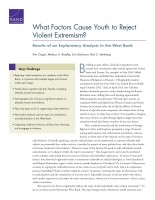| 来源类型 | Research Reports
|
| 规范类型 | 报告
|
| 来源ID | RR-1118-CMEPP
|
| What Factors Cause Youth to Reject Violent Extremism? Results of an Exploratory Analysis in the West Bank |
| Kim Cragin; Melissa A. Bradley; Eric Robinson; Paul S. Steinberg
|
| 发表日期 | 2015
|
| 出版年 | 2015
|
| 页码 | 20
|
| 语种 | 英语
|
| 结论 |
Family Plays a Greater Role Than Friends in Shaping Attitudes Toward Nonviolence- Peer groups might have an effect on radicalizing individuals, but family influence appears more likely to dampen a propensity toward violence.
Fear Is Scalable- Fear only goes so far in suppressing violent behavior.
- Fear of arrest or personal safety dissuades some individuals from becoming involved in terrorism, but there is a divergence in attitudes toward detention and arrest.
- Family obligations can drive individuals toward more-risky behavior.
Opposing Violence in Theory Is Distinct from Choosing Not to Engage in Violence- Polls designed to measure the extent of support for political violence, or lack thereof, will not accurately reflect radicalization or a willingness to engage in violence.
- Policies shaped by studies of social media might lead policymakers in the wrong direction when it comes to counterradicalization programs.
|
| 摘要 |
- Policies aimed at undermining radicalization should emphasize family members — especially parents — more than friends. These policies should work through civil society leaders to teach parents how to discuss the detrimental messages present on social media, whether or not these messages are linked to political violence. It is also important to build on other social programs designed to strengthen families' influence on youth and ties to local communities.
- Since apathy had a greater positive impact on nonviolence than activism, policymakers should be wary of relying on nonviolent forms of activism as a means of redirecting individuals away from terrorism.
- Future studies on radicalization — or rejecting extremism — should be careful not to equate measures of support for political violence with a willingness to engage in violence.
|
| 主题 | Al Qaida
; Counterterrorism
; Terrorism
; Violence
; West Bank
|
| URL | https://www.rand.org/pubs/research_reports/RR1118.html
|
| 来源智库 | RAND Corporation (United States)
|
| 资源类型 | 智库出版物
|
| 条目标识符 | http://119.78.100.153/handle/2XGU8XDN/108122
|
推荐引用方式
GB/T 7714 |
Kim Cragin,Melissa A. Bradley,Eric Robinson,et al. What Factors Cause Youth to Reject Violent Extremism? Results of an Exploratory Analysis in the West Bank. 2015.
|
|
文件名:
|
x1496838515954.jpg
|
|
格式:
|
JPEG
|

|
文件名:
|
RAND_RR1118.pdf
|
|
格式:
|
Adobe PDF
|
除非特别说明,本系统中所有内容都受版权保护,并保留所有权利。